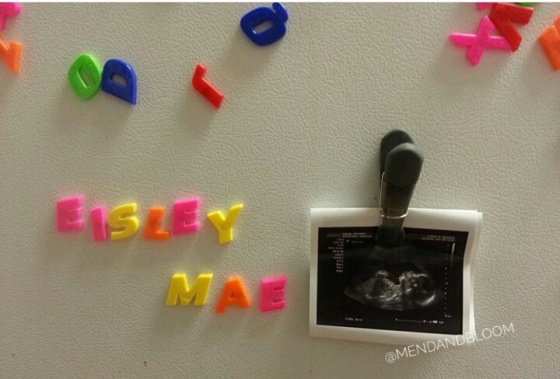When we received Eisley’s diagnosis at my 23 week anatomy scan, I walked out of the ultrasound feeling like I was no longer pregnant with a baby, but with a diagnosis. I was pregnant with spina bifida. Or so it felt like. We didn’t even know if it was a boy or a girl, but we knew that the baby had spina bifida.
Thankfully, we had our gender reveal party two days later, and we found out she was a girl. The next day, I turned to Josh, and said, “We need to name her. Tonight.” I made a short list of names while he was at work, and that night, we decided on one. Eisley Mae.

Finally, I felt like I was pregnant with Eisley and not spina bifida. She had a name, and an identity beyond her diagnosis. And for the rest of my pregnancy, I could be excited about the person she would be, disability and all.
Now that she is here, it is much easier to see her humanity beyond her disability. Sure, she is almost 15 months and has yet to pull up on her own, but she also loves Daniel Tiger and says, “Maow!” when she sees one of the cats. I have to be aware of her behavior and watch for symptoms of shunt malfunction, but she loves bananas and cuddling, like many other 15 month olds do.

I want the world to see her as I do-a person first. She is different than a typical person, but she has so much more to her than her disability. For this reason, I am very careful about the language I use when speaking or writing about her. Rather than saying “she’s a spina bifida baby,” I say, “she has spina bifida,” or, “she’s a baby with spina bifida”. It’s a very subtle difference, but an important one. Person First language seeks to define the person as just that-a person. Their disability is a descriptor, and should be used after their humanity. Just like I would prefer not to be described as “a short girl” but rather, “a girl who is short”. In my case, my short stature is not a disability, but it is true. I am 5’0″, well below average height, but that is not the most important characteristic about me.
The same applies for people with adaptive equipment, as well as other disabilities. Rather than describing someone as “confined to a wheelchair” (which is another blog entirely-they are not “confined”-their wheelchair actually gives them freedom and abilities they would otherwise not have without it!), it is more respectful to describe them as a “person who uses a wheelchair”, or a “wheelchair user”.
Although I am not a part of other disability parenting communities, I have heard that many other disability communities champion Person First language as well. So instead of saying “He’s a Downs kid,” a more respectful phrasing would be, “He has Downs Syndrome.”
If disability is not your every day, it may not seem like a big deal, so why bother? It does take a little bit of thought and effort to change the way we think and speak about others, but from my experience, you can’t ever go wrong with being respectful. If you’re not sure, a good rule of thumb is to listen to how a person with a disability describes him or herself. They would not refer to themselves in a way they feel is offensive, so it is usually a respectful way to describe them. And many people with disabilities are open to educating others about their disability, so you can also just ask them what they prefer.
Words matter, and they do sometimes hurt. Being thoughtful with your words can make a world of difference to someone who already has to work so hard to be known and respected by the world.
Maybe people get tired of me gushing about Eisley, but I don’t think I’ll ever stop. #sorrynotsorry. I just want everyone to know what an amazing person she is.
A person with spina bifida.


She’s just precious! I have no doubt that she will grow up having spina bifida instead of spina bifida having her. It sounds silly to people who haven’t experienced it, but words do matter. Although my disability is a part of my identity, it’s one of a million different things that make me who I am.
just beautiful i have a little boy with SB and i feel i was completly blessed hes amazing just like the other SB Warriors
I love this! I like differing abilities too.